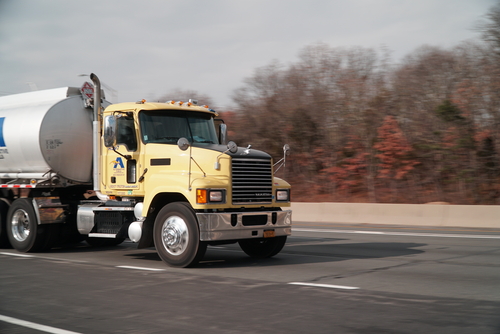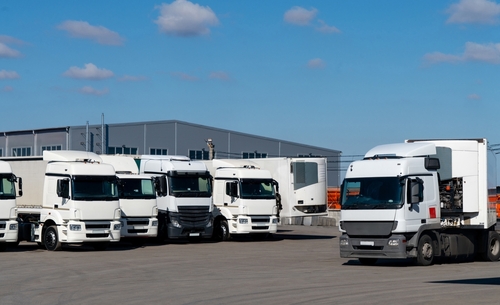A truck jackknife accident happens when the trailer of a semi-truck swings out to a 90-degree angle from the cab, creating a shape like a folding pocketknife. These incidents are most frequently caused by a combination of factors, including improper braking by the driver, unsafe speeds for the road conditions, equipment failure, or unbalanced loads. An Edmonton truck accident lawyer can investigate these factors, identify liability, and help you pursue the compensation you need after such a crash.
The injuries that result range from traumatic brain injuries and spinal cord damage to multiple fractures and fatalities, as the out-of-control trailer can sweep across multiple lanes of traffic.
If you have questions about a recent jackknife truck accident, call us for a free consultation. Our team is here to help you understand your options. Call MNH Injury Lawyers at (888) 664-5298.
Why Do Semi-Trucks Jackknife? A Look at the Most Common Causes

When the drive wheels on the tractor lock up while the trailer’s wheels continue to move forward with momentum, the trailer has nowhere to go but out. It pivots sharply, swinging wide and completely overwhelming the driver’s control. In these situations, the consequences can be devastating, which is why it is vital to Choose a Personal Injury Lawyer who understands how to investigate jackknife accidents and hold the responsible parties accountable.
Think of it like a bicycle’s back wheel skidding out on a patch of ice while the front wheel stops—the back end tries to catch up with the front, leading to a total loss of control.
While this physical reaction is the immediate cause, it is almost always triggered by a specific action or failure.
What are the most frequent driver-related causes?
The person behind the wheel has the most direct control over the vehicle, and their actions—or inactions—are frequently at the centre of a jackknife crash.
Improper Braking:
Commercial trucks have complex braking systems. A key distinction is between the service brakes (similar to those in a car) and the engine brake, or “jake brake,” which uses the engine’s compression to slow the truck. Overusing the engine brake, especially on slick or low-traction surfaces like wet or icy roads, can cause the drive wheels to lose their grip and lock up, initiating a jackknife. For victims of a Truck Injury in Alberta, these technical failures highlight why a detailed investigation is critical to proving fault and securing compensation.
Panic braking is another common trigger. An inexperienced or startled driver who slams on the brakes can easily cause the wheels to lock, particularly if the truck is empty or lightly loaded, as there is less weight pressing the tires to the pavement.
Unsafe Speeds for Conditions:
This is one of the most significant factors in commercial truck accidents. A fully loaded semi-truck can weigh up to 80,000 pounds and needs a much longer distance to stop safely than a passenger car. When a driver travels too fast for the conditions—whether it’s rain, snow, fog, or a sharp curve—that required stopping distance increases dramatically. Alberta’s Traffic Safety Act requires all drivers to operate their vehicles at a speed that is “reasonable and prudent under the conditions.” For a commercial truck driver, this standard is even higher due to the inherent dangers of their vehicle.
Driver Fatigue:
A tired driver is a dangerous driver. Fatigue slows reaction times, impairs judgement, and can even lead to falling asleep at the wheel. To combat this, Transport Canada has established strict Commercial Vehicle Drivers Hours of Service Regulations that limit how long a commercial driver can be on duty and behind the wheel. These federal rules mandate specific rest periods. When drivers or their employers ignore these rules to meet tight deadlines, the risk of a fatigue-related crash skyrockets.
Driver Inexperience or Poor Training:
Handling an 80,000-pound vehicle in adverse conditions is a skill that requires significant training and experience. A new driver may not know how to properly apply the brakes on a wet road or how to correct a minor skid before it becomes an uncontrollable jackknife. Trucking companies have a legal duty to ensure their drivers are properly trained for the specific trucks they operate and the routes they travel, especially Alberta’s challenging winter conditions.
Distracted or Impaired Driving:
Any activity that takes a driver’s attention off the road is a distraction. Using a cell phone, adjusting a GPS, or eating can have devastating consequences. Driving under the influence of alcohol or drugs is not only illegal but also dramatically increases the risk of a catastrophic accident. Commercial drivers in Alberta are held to a stricter standard; they are considered legally impaired with a blood alcohol concentration (BAC) of 0.04% or higher under the Traffic Safety Act, which is half the limit for other drivers.
What are the most common equipment-related causes?
Sometimes, the driver does everything right, but the truck itself fails. In these cases, the responsibility points back to negligent maintenance or defective parts.
Brake Failure or Imbalance:
The brakes on the tractor and the trailer must be perfectly calibrated to work together. If the trailer’s brakes engage harder or faster than the tractor’s, they can lock up and start a jackknife. Conversely, if the tractor’s brakes lock while the trailer’s do not, the trailer’s momentum will push it forward and around the cab. This type of failure points to negligent maintenance by the trucking company or a third-party repair shop. When a Jackknifing Truck Accident occurs, uncovering these maintenance issues often becomes central to holding the right parties accountable.
Worn or Improperly Inflated Tires:
Tires are the only part of the truck that touches the road. If they lack sufficient tread, they cannot maintain a proper grip, especially in wet, snowy, or icy conditions. Similarly, tires that are under-inflated or over-inflated can create instability and an uneven distribution of braking force, contributing to a loss of control.
Improperly Loaded or Unsecured Cargo:
The way cargo is loaded and secured is critical to a truck’s stability. A load that is too heavy, unbalanced, or that shifts during transit can dramatically alter the truck’s centre of gravity. This makes the vehicle unstable and highly susceptible to tipping or jackknifing, particularly when navigating curves or making sudden manoeuvres.
Common Injuries from a Jackknife Accident
When a trailer swings out, it can sweep across multiple lanes of traffic in an instant, crushing smaller vehicles in its path. An 80,000-pound truck moving at highway speed unleashes an immense level of force. The point of impact is frequently on the side of a passenger car, which offers far less structural protection than a head-on or rear-end collision. In these devastating situations, it becomes vital to File a Claim for Truck Accidents to pursue the compensation needed for medical care, lost income, and long-term recovery.
What are the most common physical injuries?
- Traumatic Brain Injuries (TBI): The sudden, violent impact can cause the head to strike the steering wheel, window, or other interior surfaces, leading to a TBI. These injuries range from concussions, which may have lingering symptoms, to severe brain damage that results in long-term cognitive deficits, memory loss, and personality changes.
- Spinal Cord Injuries: The powerful twisting and crushing forces involved in a jackknife collision can fracture vertebrae and damage the spinal cord. Such an injury may lead to partial or complete paralysis, requiring a lifetime of medical care, assistive devices, and home modifications.
- Crush Injuries and Amputations: Victims can become pinned inside their vehicles by the immense weight of the truck’s trailer. This pressure might cause severe crush injuries to limbs and internal organs. In some cases, the damage is so extensive that a limb must be amputated.
- Broken Bones and Fractures: The high-energy impact frequently causes multiple and complex bone fractures. Pelvic fractures, broken ribs, and compound fractures of the arms and legs are common and often require surgery, including the implantation of plates, rods, and screws.
- Internal Bleeding and Organ Damage: The blunt force trauma from the collision can rupture internal organs like the spleen, liver, and kidneys. This could cause life-threatening internal bleeding that requires emergency surgery to control.
What about the non-physical injuries?
The harm from a traumatic event like a jackknife accident is not limited to the body. The psychological and emotional scars are just as debilitating and long-lasting. Determining who is Liable in a Truck Accident becomes essential, since accountability extends beyond physical injuries to the emotional and financial toll victims endure.
- Post-Traumatic Stress Disorder (PTSD): Witnessing a massive trailer swing uncontrollably towards you is a terrifying experience. Many survivors of such accidents develop PTSD, suffering from flashbacks, nightmares, severe anxiety, and an intense fear of driving or even being near large trucks.
- Emotional Distress: The combination of physical pain, the stress of recovery, and the financial strain from mounting medical bills and lost income can lead to significant emotional distress, including depression and anxiety. These conditions can affect every aspect of a person’s life, from their relationships to their ability to work.
Who Is Held Responsible When a Truck Jackknifes?

While the driver’s actions are a primary focus, the chain of responsibility can extend to several other parties.
How could the trucking company be liable?
The driver may have been behind the wheel, but the company they work for holds significant legal responsibility for the safe operation of its fleet. Liability applies to the company in several ways, and When a Truck Driver Has a Fatal Car Accident, that responsibility often extends directly to the employer.
- Vicarious Liability: This is a legal concept where an employer is held responsible for the negligent acts of an employee performed within the scope of their job. If the truck driver was negligent while making a delivery or performing other work duties, the trucking company can be held directly liable for the resulting harm.
- Negligent Hiring and Training: Did the company conduct a thorough background check on the driver? Did it hire someone with a history of safety violations or reckless driving? Did it fail to provide adequate training, especially for operating in challenging conditions like Alberta’s winters? If so, the company itself was negligent in putting an unsafe driver on the road.
- Poor Maintenance: Federal regulations and Alberta’s Commercial Vehicle Safety Regulation mandate that trucking companies properly inspect and maintain their vehicles. If a jackknife was caused by worn-out tires, imbalanced brakes, or other mechanical failures, the company can be held liable for its failure to keep its fleet in safe operating condition.
- Pressuring Drivers: The trucking industry is driven by deadlines. Some companies may encourage or pressure drivers to violate hours-of-service rules to deliver loads faster. If a company’s policies push drivers to operate while fatigued, the company shares in the responsibility for any accidents that occur.
Could other parties be responsible?
The investigation sometimes reveals that entities other than the driver and trucking company played a role in the crash.
- Maintenance Shops: If the trucking company outsources its maintenance, a third-party mechanic who performed a faulty brake job or failed to identify a dangerous defect could be held liable.
- Cargo Loaders: In many cases, a separate company is responsible for loading the trailer. If this company loaded the cargo improperly, causing it to be unbalanced or to shift during transit, it could be found at fault for creating the unstable condition that led to the jackknife.
- Parts Manufacturers: If a critical component like a tire or a brake part failed due to a manufacturing defect, the company that made the part could be held liable through a product liability claim.
What if I am found partially at fault?
Alberta follows a legal rule known as “contributory negligence.” Under this doctrine, you can still recover financial compensation even if you are found partially at fault for the accident. Your final compensation award would then be reduced by your percentage of fault. For example, if you are found 20% at fault, your award would be reduced by 20%. Insurance companies will try to shift blame to the victim to reduce their payout, which is why having someone to protect your interests is so important. This also raises a common question: Can You Claim Lost Wages in Alberta if you were partly at fault? The answer is yes, though your recovery would be reduced in proportion to your share of fault.
Frequently Asked Questions About Jackknife Accidents
How long do I have to file a truck accident lawsuit in Alberta?
In Alberta, the Limitations Act requires that most personal injury claims be filed within two years from the date you knew or ought to have known about the injury and that someone else’s actions caused it. However, waiting is never advisable. It is best to act quickly to ensure that evidence, like black box data and witness memories, is preserved before it is lost or destroyed.
The trucking company’s insurance adjuster has already called me. What should I do?
You are not obligated to provide a recorded statement or sign any documents without first consulting with an attorney. The insurance adjuster’s job is to protect their company’s financial interests, and they are trained to ask questions designed to elicit responses that could be used to minimise the value of your claim. It is best to be polite, decline to give a statement, and refer them to your legal counsel.
What if the truck driver claims the jackknife was caused by bad weather?
Bad weather is a condition, not an excuse. Commercial truck drivers are held to a higher standard of care than typical motorists precisely because they operate large, dangerous vehicles. They are legally required to adjust their driving to account for road conditions. If a driver was travelling too fast for the icy, wet, or snowy roads—especially common in Alberta—they can and should be held at fault for causing the accident.
Can I still file a claim if I was a passenger in the truck that jackknifed?
Yes. As a passenger, you have the right to file a claim to seek compensation for your injuries. Depending on the circumstances, your claim might be against the driver of the truck you were in and their employer, another driver whose actions contributed to the crash, or another third party.
We Hold Negligent Parties Accountable. Let’s Get Justice Together.

Do not let an insurance company dictate the value of your health, your livelihood, and your future.
Call MNH Injury Lawyers today for a free, no-obligation consultation at (888) 664-5298.